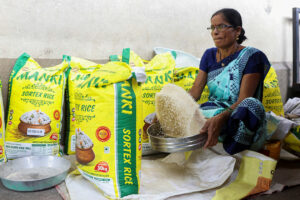THE PHILIPPINES is seen to benefit the most from an expected decline in global rice prices once India relaxes restrictions on rice exports, Nomura Global Markets Research said.
“We expect the Philippines to be the biggest winner in Asia, given the high share of rice in its consumer price index (CPI) basket, its dependence on rice imports and recent rice import tariff reductions,” it said in a report.
“The Philippines will likely benefit most from falling international rice prices, via positive terms-of-trade effects and easing domestic food price inflation.”
Market participants are expecting India, the world’s largest exporter of white rice, to relax restrictions on rice exports soon. Last year, India suspended exports of non-basmati white rice amid concerns over domestic supply.
“Since India accounted for 35% of global rice exports in 2022, making it the top rice exporter in the world, its export restrictions pushed up global rice prices and hurt rice importing nations globally,” Nomura said.
“In our view, India is likely to gradually remove the restrictions on its rice exports in coming months,” it added.
Nomura said it sees “brighter” prospects for the Philippines, which is highly dependent on imported rice.
“Net rice imports accounted for 0.4% of its gross domestic product (GDP) in 2023, the highest in Asia. As such, lower global rice prices should have the most beneficial impact on the Philippines, followed by Indonesia,” it said.
The US Department of Agriculture (USDA) expects Philippine rice imports to hit 4.6 million metric tons (MMT) this year, higher than the Agriculture department’s 3.9 MMT projection.
As of June 27, the Philippines had imported 2.31 MMT of rice, latest data from the Bureau of Plant Industry showed.
“Without price controls or subsidies, the pass-through to domestic rice prices is also significant and swift, contributing to more downward pressures on headline inflation, which is already set to be impacted by the government’s announcement of a substantial rice import tariff reduction,” Nomura said.
President Ferdinand R. Marcos, Jr. last month signed Executive Order No. 62, which slashed tariffs on rice imports to 15% from 35%, until 2028.
The measure is expected to bring down retail rice prices by P6 to P7 per kilo, the Agriculture department said earlier.
Nomura noted the weight of rice in the Philippines’ CPI basket at 8.9%, which is “much higher” than its neighboring countries.
In June, rice inflation eased to 22.5% from 23% a month ago. This marked the third straight month of slower rice inflation.
Rice accounted for 45.2% of overall inflation, equivalent to 1.7 percentage points.
“Easing inflation would further support our view that BSP will start its easing cycle by October, although the risk of an earlier first rate cut (i.e., in August) is rising, given recent comments by Governor Remolona that BSP does not have to wait for the Fed,” Nomura added.
Roehlano M. Briones, a senior research fellow at the Philippine Institute for Development Studies, said rice prices could further decline if India eases its restrictions.
“The rice tariff cut is expected to reduce the price by about P7. (Prices can go) lower if India lifts restrictions,” he said in a Viber message.
Latest data from the Agriculture department showed that the average price of well-milled rice ranged from P48-55 per kilogram as of July 10, while regular milled rice was P45-52.
“There could be a further decline in import prices, but exporters to the Philippines could also adjust their prices upwards knowing that we have reduced our tariffs,” Raul Q. Montemayor, national manager of the Federation of Free Farmers, said in a Viber message.
“It remains to be seen whether rice retail prices will go down and benefit consumers,” he added.
Mr. Montemayor said that based on his computations, the margin between import and retail prices shrink when import prices go up.
“Once import prices go down coupled with the lowered tariff rate, market intermediaries might just recoup the margins they lost and not pass on any benefit to consumers.” — Luisa Maria Jacinta C. Jocson
